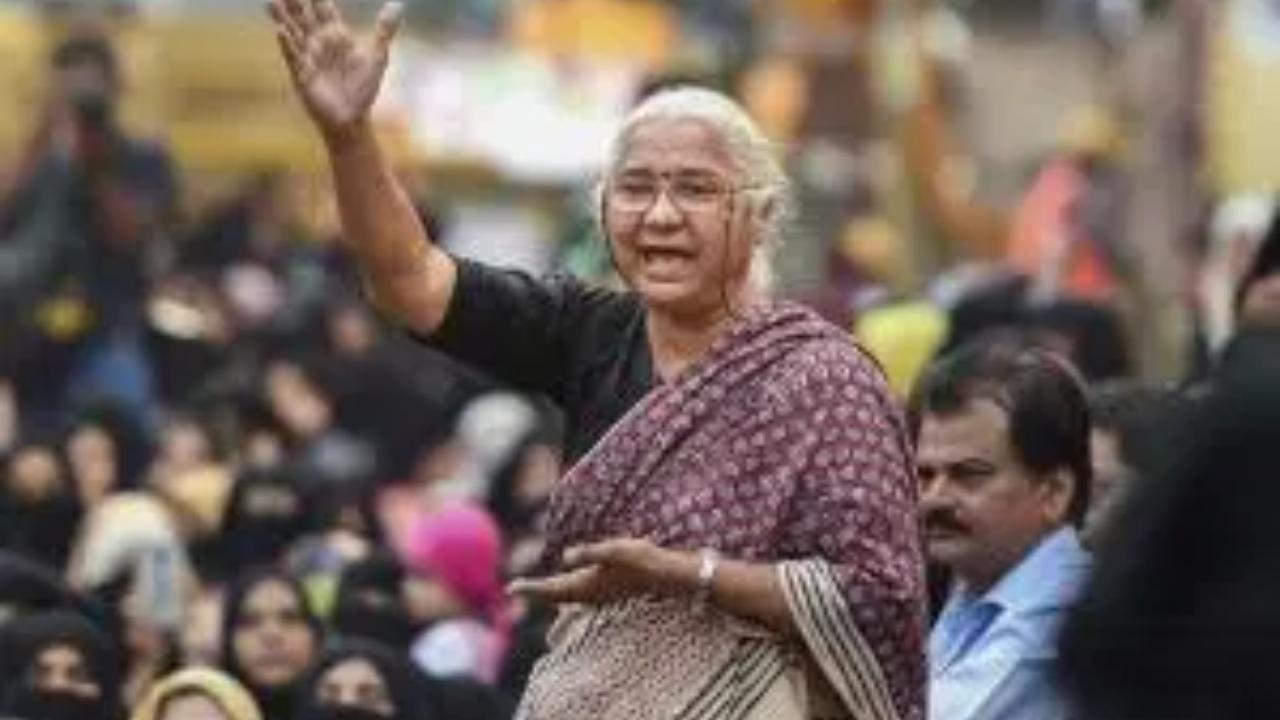The meeting of the Parliamentary Standing Committee on Rural Development and Panchayati Raj — convened to discuss the implementation of the Land Acquisition Act — was abruptly adjourned on Tuesday after BJP MPs objected to Patkar’s presence

Activist Medha Patkar. File pic
A day after BJP Members of Parliament (MP) staged a walkout from a parliamentary panel meeting to which she was invited, activist Medha Patkar on Wednesday hit back, questioning whether supporting Dalits, Adivasis, farmers and labourers is now considered “anti-national”.
The meeting of the Parliamentary Standing Committee on Rural Development and Panchayati Raj — convened to discuss the implementation of the Land Acquisition Act — was abruptly adjourned on Tuesday after BJP MPs objected to Patkar’s presence, reported PTI. Patkar had previously led protests against increasing the height of the Sardar Sarovar Dam in Gujarat under the banner of the Narmada Bachao Andolan.
The committee, chaired by Congress MP Saptagiri Sankar Ulaka, had invited Patkar to present her views on the implementation and effectiveness of the 2013 Land Acquisition Act, which was passed during the United Progressive Alliance (UPA) government’s tenure.
However, former Union Minister and BJP MP Parshottam Rupala, along with other BJP lawmakers, walked out of the meeting, with some branding Patkar “anti-national”. A BJP MP even said he had no idea that leaders from Pakistan could also be called to such a meeting, reported PTI.
“What is the charge of being anti-national? We are working with Dalits, Adivasis, farmers, labourers... Is that something anti-national? To protect their rights under the law and the Constitution, and the human rights, which are above the constitutional rights,” Patkar told PTI.
“And even if whatever we are saying is wrong, they can oppose it. But that doesn't mean that they can call us anti-national or 'urban naxals'. This democratic process includes the parliamentary standing committee proceedings,” she added.
The activist noted that she had previously participated in parliamentary panel discussions and had been involved in consultations when the Land Acquisition Act of 2013 was being drafted.
“Even when Sumitra Mahajan was in the Chair, we were given a good hearing,” she said, referring to the former Lok Sabha Speaker and BJP leader.
She maintained that her appearance before the panel was in accordance with due procedure.
Patkar said she was informed that a communication from the Secretary General of the Lok Sabha had been sent to the Chair —Ulaka — requesting cancellation of the meeting owing to lack of quorum.
However, she questioned this reasoning, saying officials told her that 17 MPs were present.
“The written letter that the secretary general gave to the chairman to cancel the meeting gave only one reason — that there is no quorum. The fact that I was invited to appear was not mentioned as the reason,” she said.
Patkar also pointed out that former Prime Minister HD Devegowda's Janata Dal (Secular), a constituent of the BJP-led National Democratic Alliance (NDA), participated in the meeting and did not join the walkout.
“Mr Devegowda, he did not walk out. He was just sitting quietly near the chairman,” she said.
Reflecting on the Narmada Bachao Andolan, Patkar said their demands were based on the award passed by the Narmada Water Disputes Tribunal (NWDT), which was constituted in 1969 to adjudicate water-sharing disputes among Gujarat, Madhya Pradesh, Maharashtra and Rajasthan.
“They are mentioning the position taken by the Narmada Bachao Andolan. Our position has been that the award by the Narmada tribunal should be implemented,” she said.
“Even the World Bank stopped funding this project (Sardar Sarovar Dam), saying that it was an ill-planned project. The statistics on which the decision is based — the data is flawed. The World Bank took a position that they had not followed the law,” she added.
The World Bank had agreed to fund the project in 1985, but after sustained protests by NBA, it set up the Morse Commission to assess the environmental impact and human displacement caused by the dam. The Bank ultimately withdrew its support, and the Indian government cancelled the loan on March 31, 1993.
Patkar also underlined the importance of proper rehabilitation for displaced families.
“There were thousands of families living in this area. How could they be denied fair and full rehabilitation? That was the question. Now, about 50,000 families have received rehabilitation. Whatever is remaining — a few thousand in Madhya Pradesh, hundreds in Maharashtra, hundreds in Gujarat — the dialogue is still going on,” she said.
“We want the government to take immediate action and decision, but they are not doing it on war footing,” she added.
(With PTI inputs)
 Subscribe today by clicking the link and stay updated with the latest news!" Click here!
Subscribe today by clicking the link and stay updated with the latest news!" Click here!








